What Your Food Cravings Mean And How To Deal With Them

We all know that feeling when it hits. All of a sudden, seemingly out of nowhere, food cravings can come on so strong that we can’t seem think about anything else. Well, until we give in and eat what we were craving.
Then, we think to ourselves, “that was so weird”. But actually, not really.
In fact, it turns out, food cravings may just be your body’s way of communicating with you. Not so much that it desperately needed that hit of sugar or carbs. But rather, that there may an imbalance happening in your body.
And it could even be a mental, emotional, or physical imbalance. Food cravings may be your body’s way of telling you how you’re feeling.
Sometimes, decoding your food cravings may help you curb those random intense desires for certain foods.
Let’s dive into everything you need to know about food cravings and how to deal with them.
But first, let’s talk about the difference between cravings versus hunger.
Food Cravings vs. Hunger
An intense craving for any food (but usually treats) is often mistaken as hunger.
So, how do you spot the difference between actual hunger and a food craving?
When you really (really!) want to eat one specific food, that’s a craving. Food cravings are frequent, intense, and irresistible desires to consume a particular type of food.” Cravings can start as soon as you think about that food. The longing for that food can consume your thoughts and compel you to find and eat it. Even if that means stopping what you’re doing and heading straight to the fridge, cupboard, or store – immediately. And only that specific food you are longing for will satisfy your craving.
Whereas with hunger, we just want food. And just about any food will do. Hunger satisfies our basic need for sustenance. So, when you’re truly hungry, you will eat anything.
Why Do We Have Food Cravings?
Food cravings are powerful and can be quite intense. They are often thought to be associated with nutrient deficiencies (read my post all about essential nutrients your body needs). Sometimes it is just that. But it may not always be the case. Sometimes, it may be caused by a combination of social, mental, emotional, cultural, and environmental cues.
That’s because food has become attached to what we turn to when we’re feeling sad or feel like we deserve a reward. Which is exactly why devouring a pint of ice cream is synonymous with a breakup. Or why having a beer or chocolate cake are go-to’s when you’ve accomplished something badass. But food cravings for one particular item can also mean something deeper is churning beneath the surface.
There are two main schools of thought as to why we have food cravings. And you’ve probably heard of and even experienced both.
1. Deficiency Hypothesis
The idea behind the deficiency hypothesis is that when we have a physical need for a specific nutrient or food, our brain tells us to get it. It is as though your body senses that you are deficient in a certain nutrient and need to replenish it. And so, we crave the food containing that nutrient to get more of it.
2. Conditioning Hypothesis
The idea behind the conditioning hypothesis is that we are psychologically and behaviourally conditioned to want certain foods when we feel certain emotions or are in a certain environment. Essentially, our feelings and habits drive us to crave a food.
For example, if you’re used to snacking when watching TV or a movie, you may crave popcorn. Your popcorn craving is simply because you’re in front of a screen, not because you’re low in sodium.
Another example is craving comfort foods when we’ve had a bad day or it’s nostalgic.
So, do we crave foods to fill a nutritional (physical) need or an emotional one?
To answer this question, think about what would end your craving, based on each hypothesis.
- In the deficiency hypothesis, the craving should end when you get enough of the food or nutrient that you are presumably low in. When you have enough of that nutrient, your cravings should naturally go away because your body doesn’t physically it need any more.
- In the conditioning hypothesis, your cravings should subside if you stop satisfying them. Meaning, by refraining from enjoying delicious foods when you are not hungry (because it’s a habit or to help you feel better), you can reduce the pull of those food cravings.
Now that we know why, let’s dive deeper into what your body may be saying about your specific food cravings.
Sugary Sweet Food Cravings
Sometimes, but definitely not always, you will crave sugar in response to imbalanced blood sugar levels. Meaning, if you have low blood sugar, your longing for that lollipop may be super intense. Blood sugar imbalance can happen for many reasons. Some of which include not eating enough, or eating too much carbs and not enough protein and healthy fats.
Sugar cravings can also strike when you’re tired or stressed. That is because sugar tends to be a quick source of energy when our body is feeling lethargic and needs a boost of energy.
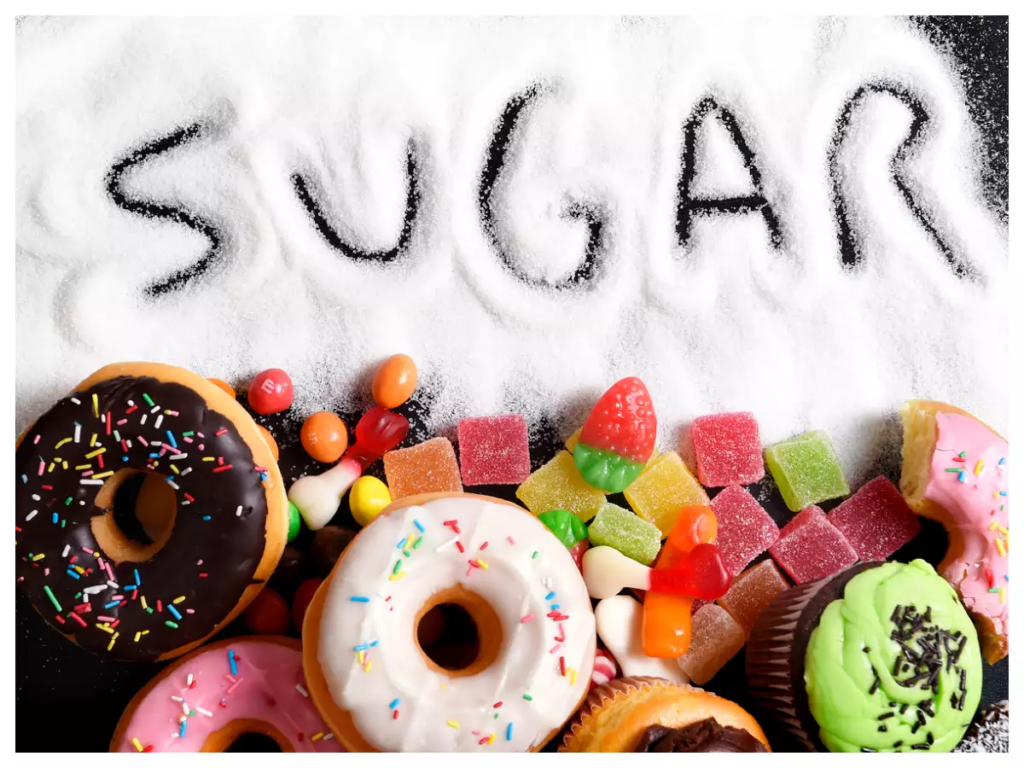
Craving something sweet can also mean your body is trying to give you a glimpse into your emotional health. For example, when something is bothering you, it’s common to crave cakes, cookies, and chocolate. It could be from stress, a breakup, or even anger. And the bad news is, women are more susceptible to sweet cravings than men. The reasons for why are complex. But suffice to say it may be linked to hormones. So, next time you polish off a pint of ice cream, it may be because you’re not feeling quite yourself.
How to Curb your Sweet Food Cravings
First, keep your sugar intake to a minimum. Because the more sweets you eat, the more your body will crave it.
Secondly, make sure to eat balanced meals containing complex carbohydrates, lean protein and healthy fats. And also, eat a high-fibre diet to nourish those healthy gut bugs (read about how fibre can shape your gut microbiome in my previous post here). Because as we learned in my microbiome post, your gut microbiota can influence your food choices.
Thirdly, if sugar cravings keep popping up because you’re constantly tired, try improving your sleeping habits. Not only will enough sleep give you more energy, but it will also help with relieving stress. However, if you’re experiencing chronic fatigue (which I discuss in detail here), see your doctor. Because that may be a symptom of an underlying health condition.
Lastly, to combat sugar food cravings immediately when they strike, try going out for a brisk walk. Research shows that walking for 15 minutes can help subside that powerfully intense longing for that sugary food.
Even soaking up some sunshine and breathing fresh air can help relieve the mental and emotional stress that is causing your sugar craving.
Chocolate Food Cravings
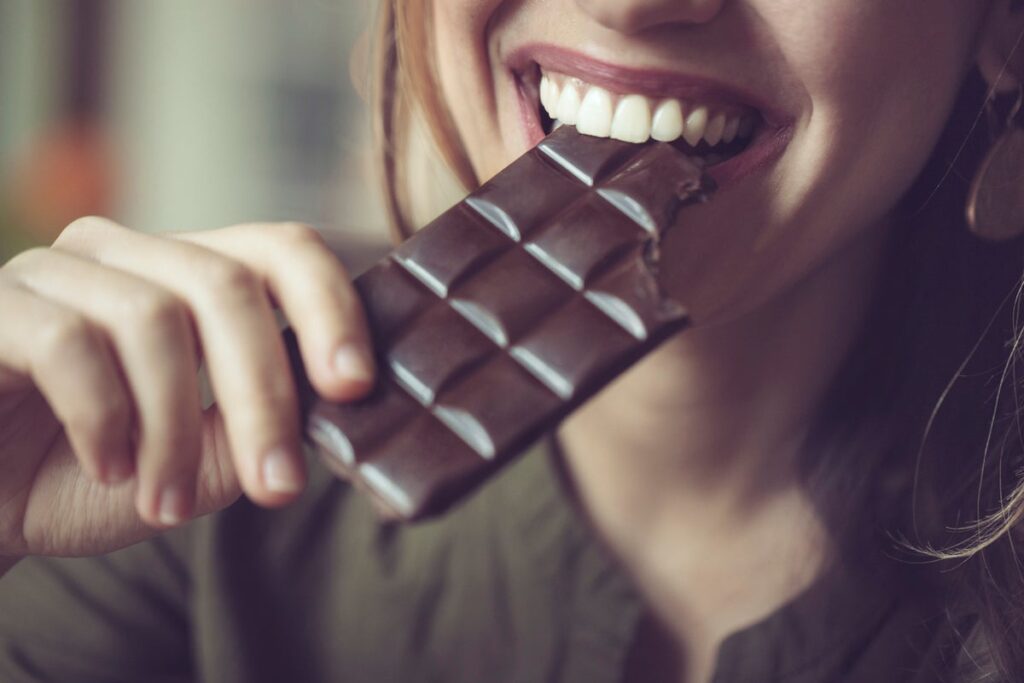
Technically, chocolate falls under the ‘sugary sweet’ food craving category. But sometimes you could still be craving something chocolatey even when your emotional game is under control and you are consistently sleeping 7 to 9 hours a night. That is when you should have your magnesium levels checked because your chocolate craving may indicate a nutrient deficiency. Especially during that time of the month when you are expecting your period. The reason is because during your menstrual cycle, your body uses up more magnesium. Which explains why many women experience PMS and strong chocolate food cravings simultaneously.
To curb your intense chocolate craving during your period, try rewiring your taste buds by reaching for other foods high in magnesium. Foods like dark leafy greens, avocados, and bananas.
Salty Food Cravings
Have you ever finished a sweaty workout only to feel an intense craving to scarf down an entire bag of potato chips? Sure, you likely burned off a ton of calories so your body is looking to refuel. But your craving for salt may likely be due to dehydration. In this case, salty food cravings are often your body’s way to signal an electrolyte imbalance. Your salt cravings can be from other things too, like an illness, chronic stress, drinking too much alcohol, or certain medications. Even stomach issues that causes a change in your pooping habits (read all about what your poop says about your gut health here) can make you crave more salty foods.
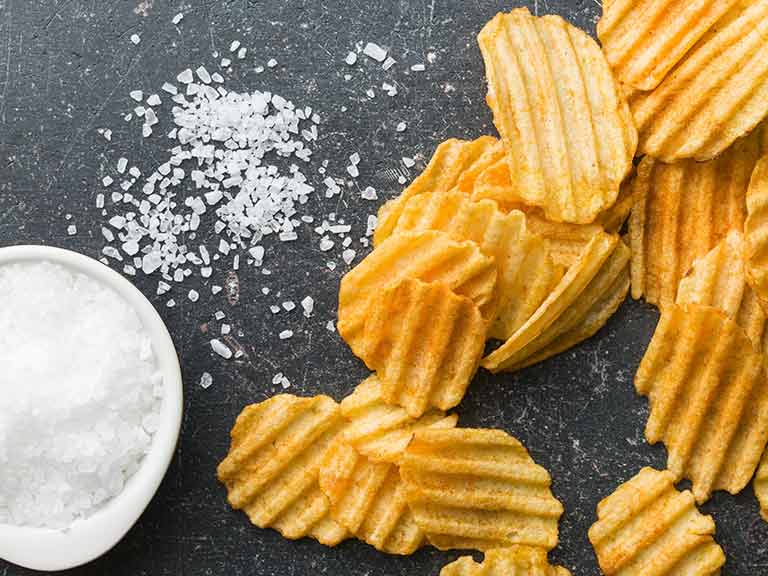
How to Curb Your Salty Food Cravings
However, instead of grabbing a bag of chips, try rehydrating with a sports drink for a hit of electrolytes for immediate relief of your salt craving. Snacking on healthy foods that are naturally higher in salt, like beets, celery, and carrots may help. And also, since hydration is key to kick your salt craving, add a pinch of salt to your water. And add some salt to your meals. Doing so will definitely rebalance those lost electrolytes while also curbing your urge to reach for a salty snack.
Red Meat Food Cravings
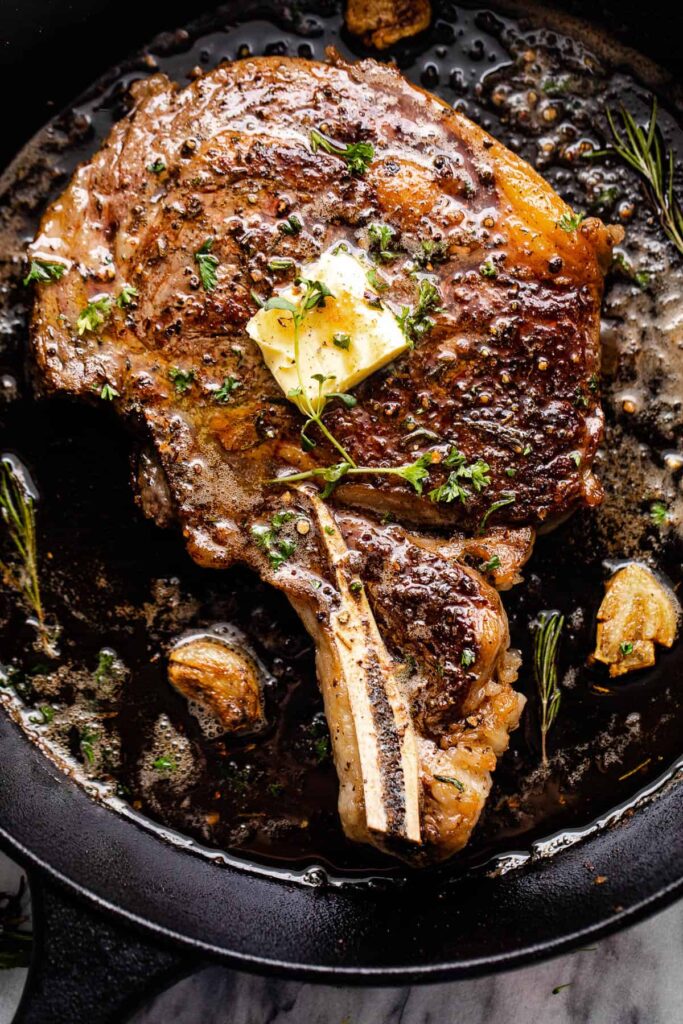
This may sound weird, but every month during my menstrual cycle, I get intense cravings for a big hunk of red meat. And only a perfectly cooked piece of steak will satisfy my craving.
But actually, it is not that weird. In fact, red meat cravings are likely your body’s way of telling you that you may be deficient in iron, zinc, or Vitamin B12. And since it is not uncommon for women to become iron deficient during that time of the month, it is no wonder that I crave a nice hunk of steak during my period.
HOW TO CURB YOUR Red meat FOOD CRAVINGS
Instead of curbing your red meat craving, give into it and eat it! Because simply eating a 4 to 6 ounce of steak will easily replenish your low iron levels.
However, if you find yourself frequently wanting to down a huge hamburger, try including more nutrient dense foods into your diet to ensure you are not deficient in any other nutrients. In my previous post, I discuss in detail the essential nutrients women should be taking daily to prevent deficiency; read it here.
Carbohydrate Food Cravings
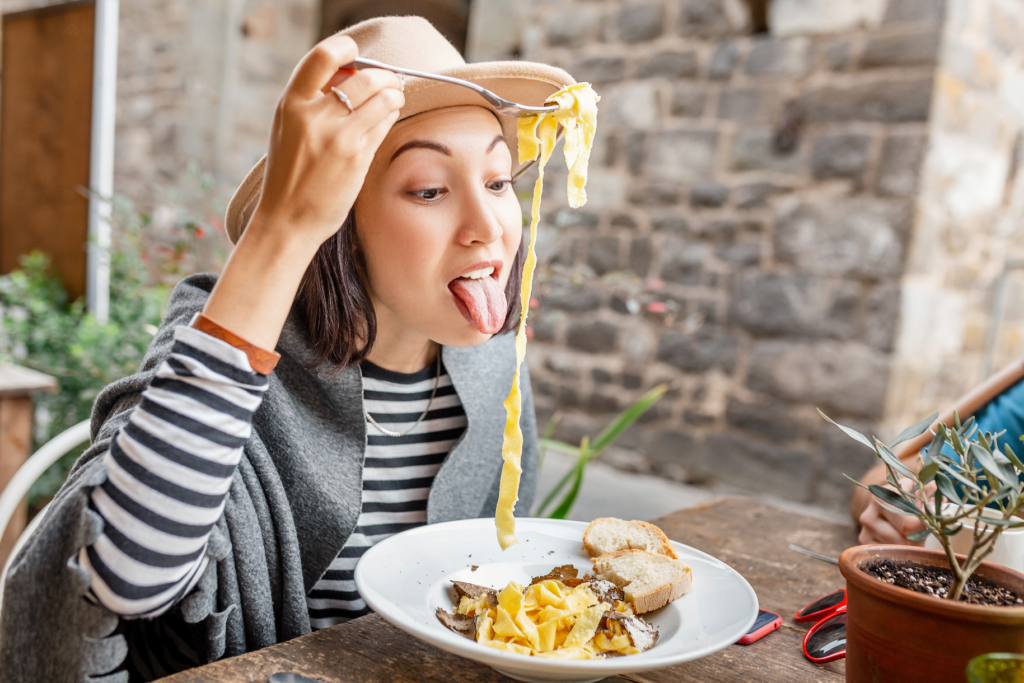
Although craving pasta, bread, and other types of carbs can come from other physiological reasons, such as high insulin levels, it is more likely to happen when people deprive themselves of these foods.
Some people, when trying to slim down, put themselves on a strict low-carb diet plan. And so, they declare carbs ‘off-limits’. The problem with this approach is that when something is forbidden, it becomes that much more desirable. Therefore, most of the time when carb cravings hit strong, it may be because you are depriving yourself of an entire food group for too long.
So, instead of carbs being off-limits, eat them in moderation. Because you will be less likely to overindulge and go overboard when you do cave into your carb cravings. And reach for healthy complex carbs, like sweet potatoes, quinoa, or legumes and beans.
Cheesy Food Cravings
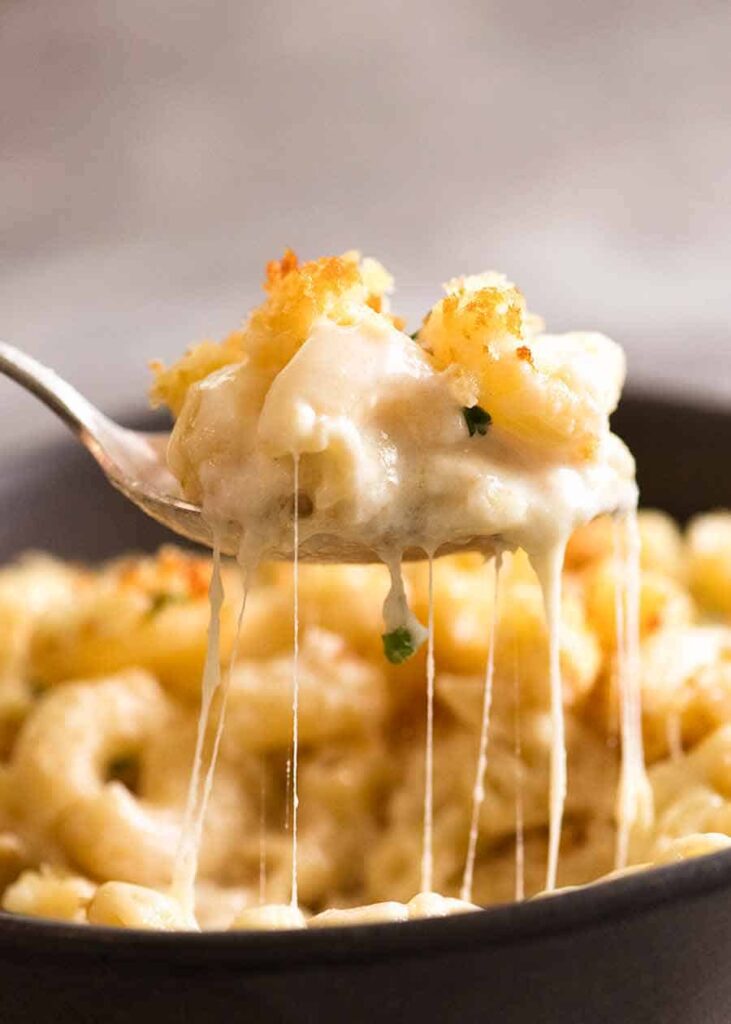
Have you ever noticed that when you have a bad day, all you want is to eat some ooey, gooey, cheesy pizza? Or a big ol’ bowl of mac’n cheese? With extra gooey cheese? It’s not so much the cheese that you are craving. But rather, it’s the ‘comfort food’ that your body has been conditioned to yearn for after a hefty load of emotions. And those types of meals are usually dripping with L-tryptophan. L-tryptophan is an amino acid found in cheese, turkey, and nuts that boosts serotonin production. And serotonin is a hormone that influences how happy you feel.
So, when you’re craving something cheesy, it may be your body’s way of seeking a ‘feel good’ boost.
How to Curb Your Cheesy Food Cravings
If you’re trying to resist those ‘comfort foods’, which you don’t always have to, try doing some relaxing yoga, meditation, or even getting together with friends and family to help boost your mood.
Caffeine Cravings
Before kids, caffeine wasn’t part of my morning routine. But now, with 3 kiddos, I crave my morning cup of java. Even when I wake up feeling refreshed. Caffeine cravings can happen for many reasons.
Sometimes it’s simply just a habit, while other times you are reaching for that afternoon latte to help fight exhaustion, lethargy, stress, or even thirst.

But sometimes, caffeine cravings may be a sign of low iron levels since symptoms of iron deficiency include fatigue and low energy.
How to Curb Your Caffeine Cravings
Before reaching for that double shot of espresso, try downing a glass of water first. Because not drinking enough water can lead to a dip in your energy levels. Also, make sure you’re getting enough good quality sleep every night so you wake up feeling rested. And eating foods high in iron, like beans, spinach, red meat, and broccoli may help stave off those caffeine cravings in the first place.
Crunchy Food Cravings
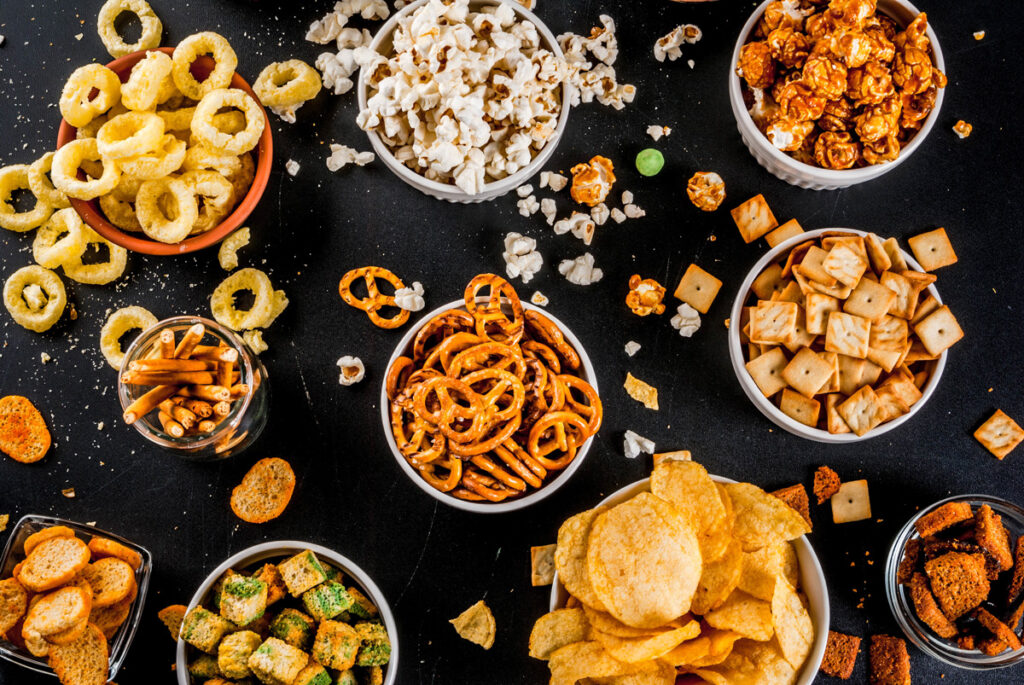
Sometimes, after a long stressful day of work, all you want to snack on is a bag of chips or a handful of nuts or a few carrot sticks. Anything crunchy will do. This may be a hint to an inner frustration or stress that you need to let out. And the simple act of chewing and the crackling of the food in your mouth can momentarily release that angst. Most of the time, the crunching does the trick. However, sometimes, the second that the crunching stops, the frustration returns. That is when you go back to polishing off that entire bag of chips.
How to Curb Your Crunchy Food Cravings
A better way to release that tension is to punch a punching bag or do some high kicks. In fact, any kind of exercise will release endorphins that will no doubt boost your mood and relieve the frustration. Another way is to put in your AirPods and listen to some music. Because many studies have shown that music is an effective way to relieve stress. But if all else fails and you just need something crunchy, keep a bag of baby carrots on-hand so it can be your go-to crunchy snack.
Junk Food (Fast Food) Cravings
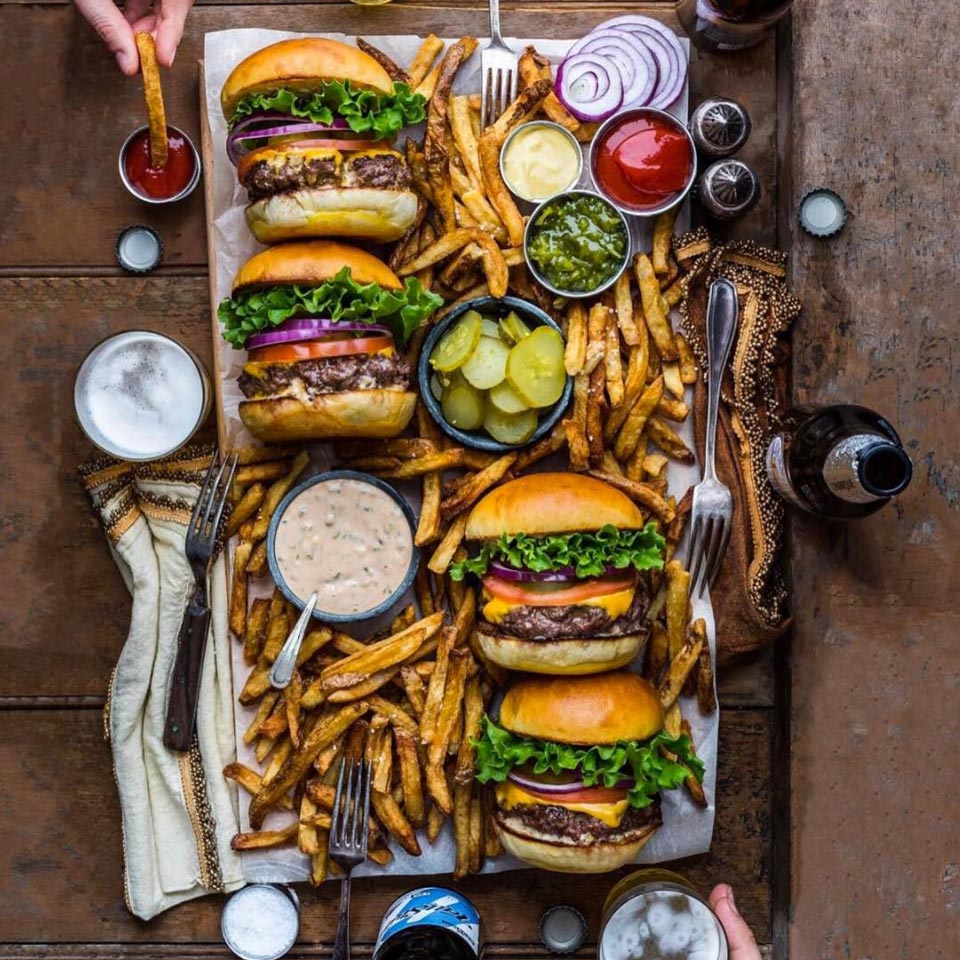
The problem with junk food cravings is that, sometimes, it is more of a food addiction than a craving. In fact, junk food cravings actually hijack your brain’s reward system such that the brain releases dopamine and other neurochemicals that your brain interprets as pleasurable. And therefore, each time you take a bite of that greasy cheese burger, it feels good. And this ‘good feeling’ drives you to keep satisfying the craving over and over again. It becomes a vicious cycle.
And therein lies the problem. Eating junk foods can strengthen that reward system and make it more difficult to resist eating them. Because you aren’t actually craving that specific junk food anymore. But rather, it is the feeling that the junk food elicits that you are yearning for. And so, it can become more of an addiction.
How to Curb YOUR Cravings for Junk Food
Overcoming junk food cravings can be quite tricky. Especially if you eat it all the time and because it so easily accessible. However, the best way to minimize junk food cravings is to limit the amount you eat. Because the more you eat it, the more you want it. So, if you only let yourself have it on special occasions, such as your birthday, or a friend’s birthday, you may be less inclined to crave it after a long stint without it.
Healthy Food Cravings
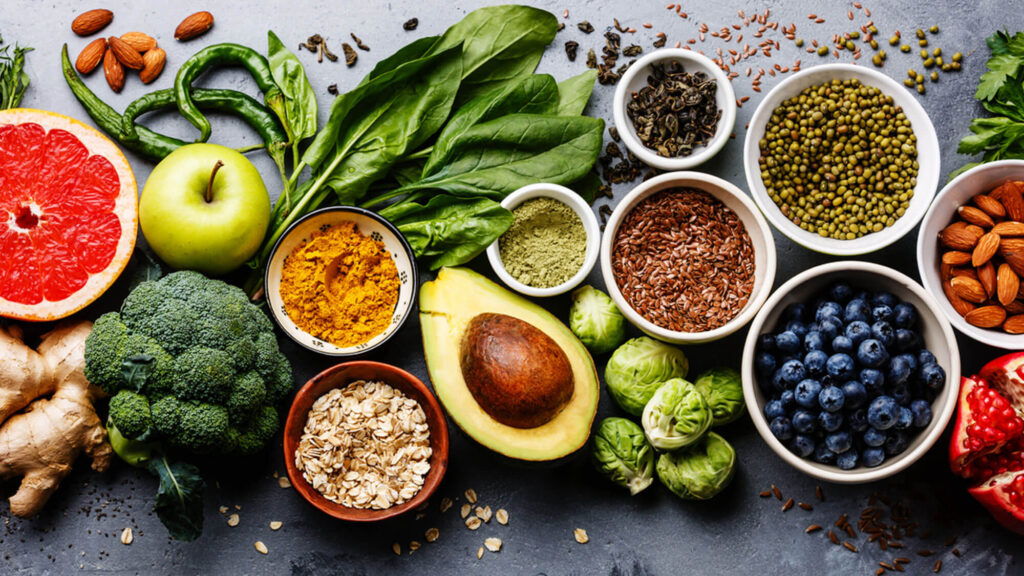
Craving healthy food is definitely not a bad food craving to have.
When your body craves healthy foods, it is most likely a sign that you are experiencing a nutrient deficiency. And that craving is signalling your brain to eat that food containing those nutrients.
And the good news is, if you are consistently eating a diet full of healthy foods, it can actually lead your body to become more ‘addicted’ to those foods. This food craving is one that you don’t have to fight. In fact, it is welcomed, as it will make you feel better after you give in and eat it.
The Bottom Line
Food cravings are a normal part of being human. It is perfectly okay to indulge in your food cravings from time to time. Eat it, enjoy it, and forget about it.
Food cravings only become a problem when you frequently over-indulge and it leads to an unhealthy habit. But more, if giving into your food cravings bring on feelings of guilt and shame, it may be a sign of a bad relationship with food. At which point, it may be prudent to speak to a health care professional.
Aside from that, food cravings can bring feelings of joy, comfort, and nostalgia. So, if you’re craving that piece of chocolate or a donut, eat it! Because it may be your body’s way of saying, “enjoy life”!





